

Operant conditioning may be the solution to curating your teenage children’s behaviour. The difference between classical and operant conditioning - Peggy Andover. Skinner’s Operant Conditioning: Rewards & Punishments. Operant conditioning diagram rev. Reinforcement and Punishment. Learning Objectives.
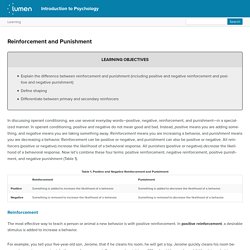
Learning: Negative Reinforcement vs. Punishment. Reinforcement & Punishment. Reinforcement and Punishment: Examples & Overview. Reinforcement and Punishment - How to Approach These Concepts in ABA Parent Training — ABA Parent Training: Curriculum, CEUs, Support, & More. As behavior analysts, we understand what the terms “reinforcement” and “punishment” mean in the field of applied behavior analysis.
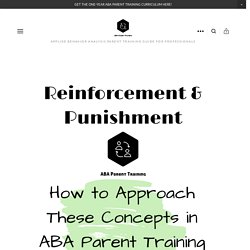
We know that reinforcement refers to the idea that a behavior increases in frequency after the presentation or removal of a stimulus follows that behavior. Reinforcement can be further defined by whether it is positive or negative reinforcement. Positive reinforcement is when a stimulus follows a behavior and that behavior increases in frequency of occurrence in the future. Negative reinforcement is when a stimulus is removed or avoided following a behavior and that behavior also increases in frequency of occurrence in the future. Punishment is basically the opposite of the concept of reinforcement. Positive Reinforcement - Tips for teaching and parenting. Positive Reinforcement in Psychology (Definition + 5 Examples) If you read our earlier piece on positive punishment, you know that there are different methods of teaching and instilling good habits and behaviors.
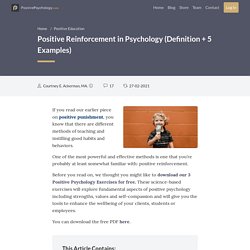
One of the most powerful and effective methods is one that you’re probably at least somewhat familiar with: positive reinforcement. Before you read on, we thought you might like to download our 3 Positive Psychology Exercises for free. These science-based exercises will explore fundamental aspects of positive psychology including strengths, values and self-compassion and will give you the tools to enhance the wellbeing of your clients, students or employees.
You can download the free PDF here. How to Use Positive Reinforcement for Positive Behaviors. The power of positive re-inforcement. Youtube. Teenagers: 20 tips for good behaviour. 10 Positive Punishment Techniques & Their Effect. By: Ashley Brown Updated February 11, 2021 Medically Reviewed By: Laura Angers As a parent, it is natural to wonder about the best way to teach your child right from wrong.
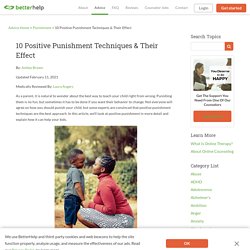
Punishing them is no fun, but sometimes it has to be done if you want their behavior to change. Not everyone will agree on how you should punish your child, but some experts are convinced that positive punishment techniques are the best approach. Teen Pleads With Parents Not To Send Him To Treatment: ‘I Swear I Will Change Everything If You J… Negative Punishment Examples and Scenarios. Nobody ever wants their stuff taken away.
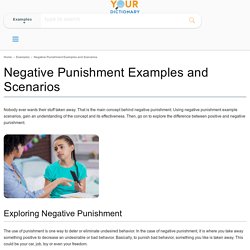
That is the main concept behind negative punishment. Using negative punishment example scenarios, gain an understanding of the concept and its effectiveness. How Negative Punishment Works. Negative punishment is an important concept in B.
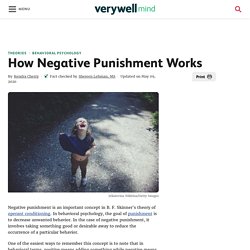
F. Skinner's theory of operant conditioning. In behavioral psychology, the goal of punishment is to decrease unwanted behavior. In the case of negative punishment, it involves taking something good or desirable away to reduce the occurrence of a particular behavior. One of the easiest ways to remember this concept is to note that in behavioral terms, positive means adding something while negative means taking something away.
Youtube. Youtube. Youtube. Encourage Teenage children to do assigned house chore. Teenage children returning home late. Teenage children being rude. Teenage children scoring poor grades. 10 Tips for Improving Parent-Teen Relationships. You know your child is an adolescent (semi-formed human) when she or he: Gives you attitude over stuff that's never been an issue before.

Refuses to do what you ask. Agrees to do it and then (un)wittingly "forgets" Denies they ever agreed to anything. Says "You don't get it! " Insults you under his/her breath. Doesn't text you back then swears they never got the msg. Slams doors, screams, roars, cries regularly. Is not much fun to live with. Experts tell parents of teens, "Don't take their words or behavior personally. " Newsletter Sign Up Raise the kind of person you'd like to know. A Parent's Guide to Surviving the Teen Years. You've lived through 2 a.m. feedings, toddler temper tantrums, and the back-to-school blues.
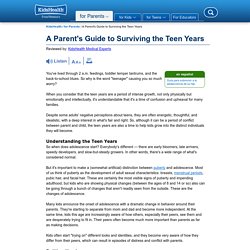
So why is the word "teenager" causing you so much worry? When you consider that the teen years are a period of intense growth, not only physically but emotionally and intellectually, it's understandable that it's a time of confusion and upheaval for many families. Despite some adults' negative perceptions about teens, they are often energetic, thoughtful, and idealistic, with a deep interest in what's fair and right. So, although it can be a period of conflict between parent and child, the teen years are also a time to help kids grow into the distinct individuals they will become. Understanding the Teen Years So when does adolescence start? But it's important to make a (somewhat artificial) distinction between puberty and adolescence. Many kids announce the onset of adolescence with a dramatic change in behavior around their parents.
Butting Heads Tips for Parenting During the Teen Years. Youtube. Youtube. Youtube. References.